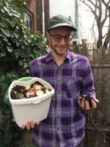How Not to Collect Organics (easy fix)
I love raccoons, but we need to make it a little harder for them in order to let composting become the norm. When people think of compost, they think of smelly, slimy food waste mixed with manure- gotta change that perception. ...looks like this place needs some help from their composting service, doesn't it? These toters are excellent- Sturdy rubber wheels on a metal axle, strong clasps, and a smooth interior that makes it easy to clean them out. However, organics need to be collected in ASTM D6400 compostable bags so they can break down appropriately along with the food scraps (totally possible they ran out temporarily, but just sayin'). If the toters aren't shut properly, all kinds of pests will be attracted to them, and rightfully so. As I…
